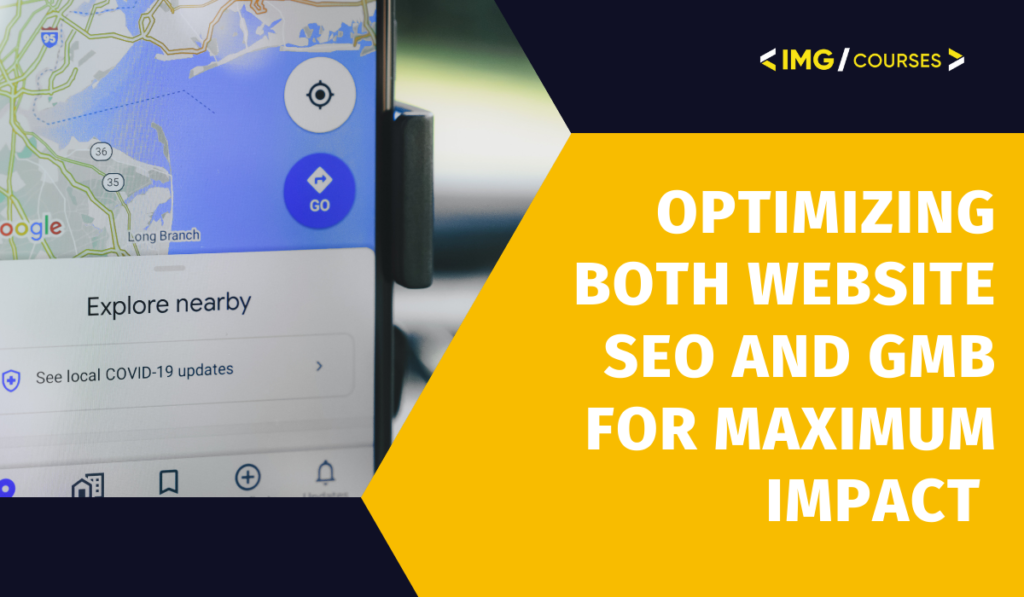
In today’s digital landscape, local SEO has become a crucial factor for small businesses looking to enhance their online visibility. At the heart of this strategy lies the interplay between website SEO and Google My Business (GMB). But does one directly influence the other?
Let’s dive into this relationship:
- Website SEO: The process of optimizing your business’s online presence to rank higher in search results.
- Google My Business: A free tool that allows you to manage your business profile on Google’s platforms.
While these two elements might seem separate, they’re actually interconnected pieces of your overall local search strategy. Many business owners wonder, “Does website SEO affect Google My Business?” The answer isn’t a simple yes or no.
Absolutely yes, your website’s optimization can have a significant impact on your GMB profile’s performance. However, it’s not a direct cause-and-effect relationship. Instead, think of it as a symbiotic partnership where improvements in one area can greatly improve your business’s search ranking and overall visibility.
As we explore this topic, we’ll uncover how these two powerhouses of local SEO work together to boost your business online and attract more local customers. Remember, in the digital age, your online visibility is often the first impression you make on potential clients. Let’s make it count!
The Direct Impact of Website SEO on GMB
When it comes to the question, “Does website SEO affect Google My Business?“, it’s crucial to understand that the relationship isn’t as straightforward as many might think. Let’s clear up a common misconception:
Website SEO doesn’t directly influence your GMB ranking.
Surprised? You’re not alone. Many small business owners assume that improving their website’s SEO will automatically boost their GMB profile. However, Google has been clear about this:
Google’s algorithms treat organic search results and local business listings separately. This means that your website’s ranking doesn’t directly determine your position in the local pack or on Google Maps.
So, why the confusion?
The misunderstanding often stems from the fact that improvements in website SEO and GMB optimization can happen simultaneously, leading to better overall online visibility. But correlation doesn’t equal causation.
Here’s a quick breakdown:
| Website SEO | Google My Business |
| Affects organic search results | Influences local pack and Maps results |
| Focuses on overall online presence | Concentrates on local visibility |
| Requires on-page and off-page optimization | Needs accurate business information and engagement |
Despite this separation, Google My Business remains the most critical source of local SEO. It’s the go-to platform for local customers searching for businesses near them.
So, while your website’s SEO efforts won’t directly impact your GMB listing, they’re still crucial for your overall online visibility. A well-optimized website can greatly improve your business’s search ranking and overall visibility in organic results, complementing your local SEO efforts.
Remember, a holistic approach to your online presence is key. By optimizing both your website and your GMB profile, you’re creating a powerful synergy that can increase your visibility across all of Google’s platforms.
Indirect Benefits of Strong Website SEO for GMB Performance
While website SEO doesn’t directly influence your Google My Business ranking, it can indirectly boost your GMB profile’s performance. Let’s explore how a well-optimized website can indirectly benefit your local SEO efforts:
1. Improved Overall Online Visibility
A strong SEO strategy can greatly improve your business’s search ranking and overall visibility. When your website ranks well for relevant keywords, it:
- Increases brand awareness
- Builds credibility in your field
- Supports your GMB listing by providing consistent information
This heightened visibility can increase the likelihood of local customers discovering and engaging with your business online.
2. Increased Website Traffic and Its Impact on Local Search Signals
Higher organic rankings typically lead to more website traffic. This increased traffic can send positive signals to Google, potentially influencing your local search performance. Here’s how:
| Website Traffic Impact | Potential GMB Benefit |
| More visitors from your area | Strengthens local relevance |
| Increased time on site | Suggests valuable content |
| Lower bounce rates | Indicates a good user experience |
These factors contribute to your overall online authority, which can indirectly benefit your GMB profile.
3. Content Consistency Between Website and GMB Profile
Ensuring consistency between your website and GMB listing is crucial. When your business address, hours, and services match across platforms, it:
- Builds trust with potential customers
- Reinforces your local business information for search engines
- Improves your chances of appearing in relevant local search results
Pro Tip: Use a rank tracker tool to monitor how your website and GMB listing perform for key local search terms.
4. Backlinks and Their Influence on Local Authority
Quality backlinks to your website not only improve your organic rankings but also enhance your local authority. Local SEO benefits when:
- Local publications link to your site
- You’re mentioned in local directories
- Community organizations reference your business
These signals can indirectly boost your GMB profile’s credibility in Google’s eyes.
5. User Engagement Metrics and Their Potential Influence on GMB
Engaged website visitors send positive signals to Google. High engagement rates suggest that your business online presence is valuable to users. This can potentially influence your GMB listing performance in several ways:
- Increased click-through rates from search results to your website
- More interactions with your Google Business profile
- Higher likelihood of customers leaving reviews on your GMB listing
Remember, while these factors don’t directly impact your GMB optimization, they contribute to a robust online presence that supports your local SEO efforts.
In conclusion, while website SEO and GMB optimization are separate entities, they work together synergistically. A strong website presence complements and reinforces your Google My Business efforts, creating a powerful combination for local business success.
Optimizing Both Website SEO and GMB for Maximum Impact

Now that we understand how website SEO and Google My Business work together, let’s explore strategies to optimize both for maximum impact on your local SEO efforts. Remember, Google My Business remains the most critical source of local SEO, but a well-optimized website can amplify its effectiveness.
1. Aligning Keyword Strategies
To create a cohesive online presence, align your keyword strategies across your website and GMB profile:
- Use consistent key phrases in your website content and GMB listing
- Incorporate location-based keywords naturally in both platforms
- Ensure your business address and service areas are prominently displayed
Pro Tip: Use a rank tracker tool to monitor how your chosen keywords perform across both your website and GMB listing.
2. Leveraging Location-Based Content
Local customers are the lifeblood of many small businesses. Here’s how to attract them:
| Website Strategy | GMB Strategy |
| Create location-specific pages | Use location-specific posts |
| Publish local event content | Share local events in GMB updates |
| Highlight community involvement | Add photos of local activities |
This approach can greatly improve your business’s search ranking and overall visibility in local search results.
3. Optimizing for Voice Search and “Near Me” Queries
With the rise of voice assistants, optimizing for conversational queries is crucial:
- Structure your website content to answer common questions
- Use long-tail keywords that mirror natural speech patterns
- Ensure your GMB listing includes all relevant business categories
Remember, many local customers use phrases like “near me” or “open now”. Make sure your GMB profile is always up-to-date with accurate hours and location information.
4. Utilizing Schema Markup
Schema markup helps Google understand your website content better, which can increase your visibility in search results:
- Implement local business schema on your website
- Include your business address, hours, and services in the markup
- Ensure consistency between schema data and your GMB listing
5. Mobile Optimization: A Must for Local SEO
In today’s mobile-first world, a mobile-optimized website is no longer optional:
- Ensure your website is responsive and fast-loading on mobile devices
- Optimize for local keywords that mobile users are likely to search
- Make sure your contact information is easily accessible on mobile
Remember, many users will navigate directly from your GMB listing to your website. A poor mobile experience can negatively impact your overall local SEO efforts.
By implementing these strategies, you’re creating a powerful synergy between your website SEO and GMB optimization. This holistic approach can do wonders for your online visibility and help attract more local customers.
Absolutely yes, while website SEO doesn’t directly affect your GMB profile, a well-optimized website combined with a robust GMB listing can greatly improve your business’s search ranking and overall visibility. It’s all about creating a consistent, authoritative presence across all of Google’s platforms.
Integrating GMB Strategies with Website SEO
To maximize your local SEO efforts, it’s crucial to create a seamless integration between your GMB profile and your website. Here are some strategies to achieve this synergy:
- Use GMB posts to drive traffic: Create engaging posts on your Google My Business profile that link directly to relevant pages on your website. This can increase click-through rates and boost your online visibility.
- Incorporate customer reviews: Showcase positive reviews from your GMB listing on your website. This can do wonders for building trust with potential local customers.
- Utilize GMB insights: Use the valuable data from your GMB profile to inform your website’s content strategy. Pay attention to:
- Popular search queries
- Customer actions
- Peak interaction times
- Create a cohesive online presence: Ensure consistency across all platforms, including your website, GMB listing, and social media profiles. This includes:
- Consistent business address and contact information
- Uniform branding and messaging
- Aligned service offerings and descriptions
By integrating these strategies, you’re creating a powerful, unified online presence that can greatly improve your business’s search ranking and overall visibility. Remember, while website SEO and GMB optimization work independently, their combined effect can significantly boost your local business success.
Conclusion
In answering the question, “Does website SEO affect Google My Business?“, we’ve uncovered a complex relationship. While website SEO doesn’t directly impact your GMB listing, it can indirectly boost your local SEO efforts. By optimizing both your website and GMB profile, you can greatly improve your business’s search ranking and overall visibility.
Remember, Google My Business remains the most critical source of local SEO, but a well-optimized website amplifies its effectiveness. The key is to create a cohesive online presence that serves your local customers and enhances your business profile across all of Google’s platforms.
To dive deeper into on-page SEO strategies, check out our On-Page SEO Mastery Course for more advanced techniques to boost your website’s performance.

